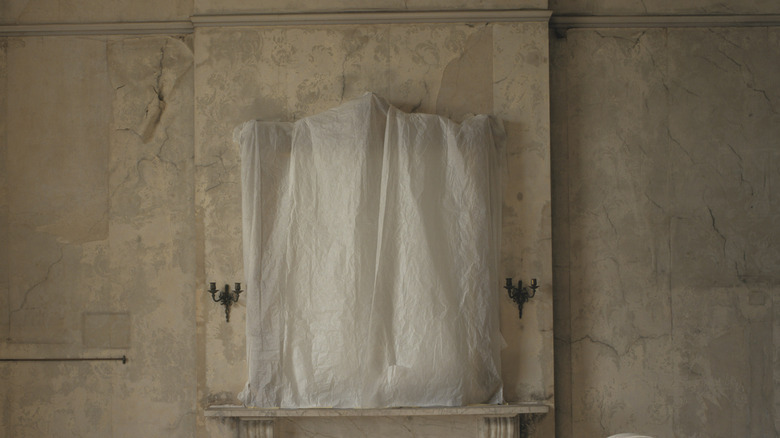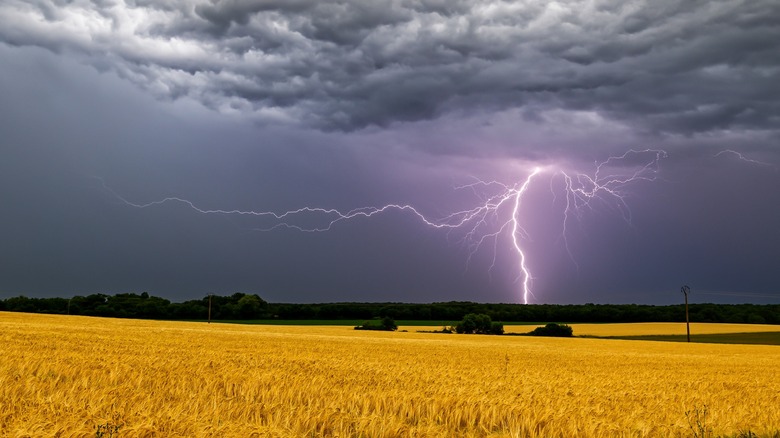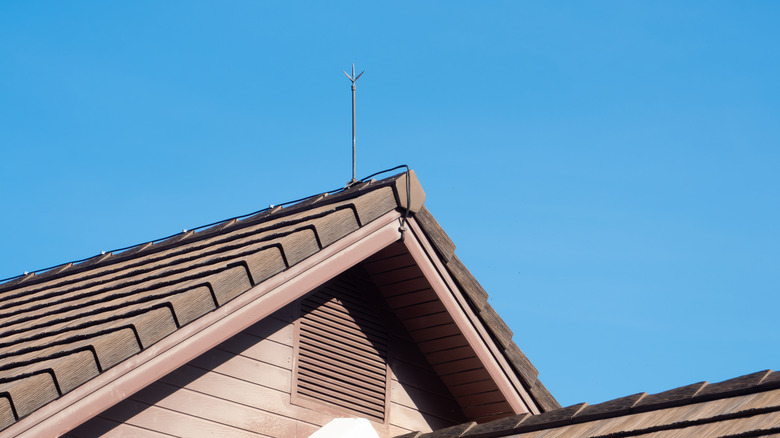Why Some People Insist On Covering Mirrors In Their House During Thunderstorms
"Mirror, mirror on the wall ... Can taking you off the wall or turning you around act as a kind of lightning protection system?" Okay, so we're pretty sure no Disney character has ever asked that question. You — or perhaps more aptly, your grandmother — might have, though, since people, especially older generations, race around the house at the first peel of thunder or flash of electricity. They're not closing windows against the coming rain, as one might suppose. Instead, they're carefully covering any mirrors with a blanket or removing them from the wall and placing them face down on the floor to prevent lighting from striking inside their home.
Odd, we know, but the practice has deep roots in some places. Perhaps the fear stems from the belief that Tien Mu, the mythological Chinese goddess of lightning, bent the electrically charged bolts to her will using mirrors. In the Mayan religious worldview, mirrors, light-reflecting surfaces, and lightning were closely related and used for divination and other practices. When the Age of Exploration (15th to 17th century) flooded the Old World with shiny metals and products manufactured from them, the heavy metal-framed mirrors popular during the era did, in fact, attract lightning on occasion and so were covered during storms. Today, people across South Africa continue to undertake the practice — a 2014 study published in Natural Hazards reported that 28% of electrical engineering students at a single South African university believed mirrors attract lightning.
Illuminating lightning strike science
For most of us, when we say we want to keep our mirrors streak-free, we rarely mean free from random streaks of lightning. So, is this practice based on handy cultural knowledge passed down through generations, with roots in provable science, or is it mere superstition? The short answer is that it's nonsense. There's zero scientific evidence that mirrors attract lightning. In the simplest terms, a lightning bolt is an electrical field created in thunderclouds that takes the easiest route to discharge into the ground. Though lighting may appear to be "attracted" to whatever it hits, that isn't the case.
Since "the faint electrical fields around radio transmitters (like the ones we all carry around in our cellphones) have occasionally been known to attract lightning" via Urban Astronomer, lightning could technically strike a smart mirror, which, like most electronics, also has a weak electromagnetic field. Still, it would be an extraordinarily rare phenomenon. What's more, glass insulates against electricity; mirrors are made of metal-backed glass, making them all but immune to lightning strikes. In other words, fears of a mirror-related lightning strike have little to do with the heavy mirrors in your home, and everything to do with superstition.
Legitimate lightning protection tips
There is, of course, no denying the danger lightning strikes pose to homes, as friends of Martin Holladay, editor at Green Building Advisor, discovered when a nearby hit "destroyed a tree, fried all of the electronics and some of the electrical wiring in both of their cars (parked outdoors) and damaged electrical wiring and equipment in their house." To put things into perspective, however, the Empire State Building gets hit 25 times a year. According to data compiled by the CDC, lightning was responsible for the death of almost 450 Americans between 2006 and 2021, and 60% of these fatalities occurred outdoors, not in.
While seeking shelter is always the right thing if it's stormy outside, it's a myth that you're entirely protected from lighting just by being indoors. During thunderstorms, it's best practice to stay clear of metal pipes and doors, wired phones, electronics, and windows. In fact, it's a good idea to turn off electrical appliances during a storm. Don't take a bath, shower, or wash the dishes by hand, either. Water is an excellent conductor of electricity. Another way to lessen the risk of damage is to invest in a lightning rod to protect your home.


